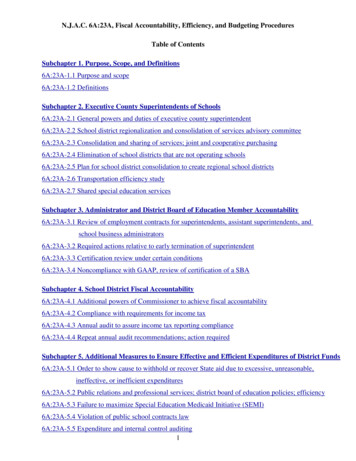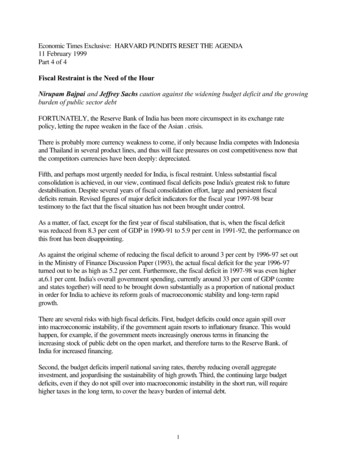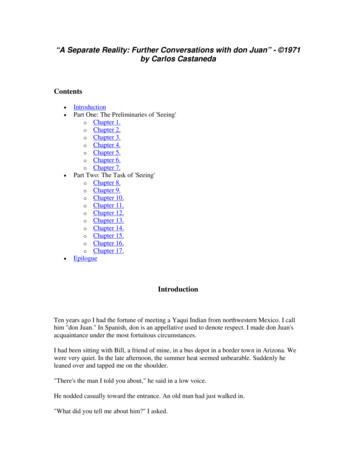
Transcription
N.J.A.C. 6A:23A, Fiscal Accountability, Efficiency, and Budgeting ProceduresTable of ContentsSubchapter 1. Purpose, Scope, and Definitions6A:23A-1.1 Purpose and scope6A:23A-1.2 DefinitionsSubchapter 2. Executive County Superintendents of Schools6A:23A-2.1 General powers and duties of executive county superintendent6A:23A-2.2 School district regionalization and consolidation of services advisory committee6A:23A-2.3 Consolidation and sharing of services; joint and cooperative purchasing6A:23A-2.4 Elimination of school districts that are not operating schools6A:23A-2.5 Plan for school district consolidation to create regional school districts6A:23A-2.6 Transportation efficiency study6A:23A-2.7 Shared special education servicesSubchapter 3. Administrator and District Board of Education Member Accountability6A:23A-3.1 Review of employment contracts for superintendents, assistant superintendents, andschool business administrators6A:23A-3.2 Required actions relative to early termination of superintendent6A:23A-3.3 Certification review under certain conditions6A:23A-3.4 Noncompliance with GAAP, review of certification of a SBASubchapter 4. School District Fiscal Accountability6A:23A-4.1 Additional powers of Commissioner to achieve fiscal accountability6A:23A-4.2 Compliance with requirements for income tax6A:23A-4.3 Annual audit to assure income tax reporting compliance6A:23A-4.4 Repeat annual audit recommendations; action requiredSubchapter 5. Additional Measures to Ensure Effective and Efficient Expenditures of District Funds6A:23A-5.1 Order to show cause to withhold or recover State aid due to excessive, unreasonable,ineffective, or inefficient expenditures6A:23A-5.2 Public relations and professional services; district board of education policies; efficiency6A:23A-5.3 Failure to maximize Special Education Medicaid Initiative (SEMI)6A:23A-5.4 Violation of public school contracts law6A:23A-5.5 Expenditure and internal control auditing1
6A:23A-5.6 School district response to Office of Fiscal Accountability and Compliance (OFAC)investigation report6A:23A-5.7 Verification of payroll check distribution6A:23A-5.8 District board of education expenditures for non-employee activities, meals, and refreshments6A:23A-5.9 Out-of-State and high-cost travel eventsSubchapter 6. Conditions for The Receipt of State Aid6A:23A-6.1 Conditions precedent to disbursement of State aid6A:23A-6.2 Nepotism policy6A:23A-6.3 Contributions to district board of education members and contract awards6A:23A-6.4 Internal controls6A:23A-6.5 Segregation of duties; organization structure6A:23A-6.6 Standard operating procedures for business functions6A:23A-6.7 Financial and human resource management systems; access controls6A:23A-6.8 Personnel tracking and accounting6A:23A-6.9 Facilities maintenance and repair scheduling and accounting6A:23A-6.10 Approval of amounts paid in excess of approved purchase orders; district board ofeducation policy6A:23A-6.11 Vehicle tracking, maintenance, and accounting6A:23A-6.12 District board of education vehicle assignment and use policy6A:23A-6.13 District board of education travel policySubchapter 7. School District Travel Policies and Procedures6A:23A-7.1 School district travel expenditures6A:23A-7.2 District board of education policy for travel expenditures6A:23A-7.3 Maximum travel budget6A:23A-7.4 Travel approval procedures6A:23A-7.5 Required documentation for travel6A:23A-7.6 SBA responsibilities regarding accounting for travel6A:23A-7.7 Sanctions for violations of travel requirements6A:23A-7.8 Prohibited travel reimbursements6A:23A-7.9 Travel methods6A:23A-7.10 Routing of travel6A:23A-7.11 Subsistence allowance – overnight travel6A:23A-7.12 Meal allowance – special conditions – and allowable incidental travel expenditures2
6A:23A-7.13 Records and supporting documentsSubchapter 8. Annual Budget Development and Submission6A:23A-8.1 Budget submission; supporting documentation; website publication6A:23A-8.2 Public notice and inspection6A:23A-8.3 Administrative cost limits6A:23A-8.4 Capital outlay budget6A:23A-8.5 Designation of general fund balances6A:23A-8.6 Appropriation of unreserved debt service fund balance; exceptionSubchapter 9. Executive County Superintendent Budget Review Procedures6A:23A-9.1 Executive county superintendent budget review6A:23A-9.2 Executive county superintendent budget review and approval; administrative andnon-instructional expenses6A:23A-9.3 Efficiency standards for review of administrative and non-instructional expendituresand efficient business practices6A:23A-9.4 Commissioner’s authority to direct expenditures to achieve T&E6A:23A-9.5 Commissioner to ensure achievement of the New Jersey Student LearningStandards; corrective actions6A:23A-9.6 Appeal of executive county superintendent budget reductions6A:23A-9.7 Procedures following voter defeat of proposed budget; municipal governing body orboard of school estimate action6A:23A-9.8 Municipal governing body failure to certify or agree; Commissioner sets tax levy6A:23A-9.9 Application for Commissioner restoration of budget reductions6A:23A-9.10 Executive county superintendent ongoing budget review6A:23A-9.11 Year-end financial procedures for executive county superintendent and State monitorSubchapter 10. Unused Tax Authority (Banked Cap)6A:23A-10.1 Unused spending authority (banked cap)Subchapter 11. Tax Levy Growth Limitation6A:23A-11.1 Adjusted tax levy growth limitation6A:23A-11.2 Adjustment for increases in enrollments6A:23A-11.3 Adjustment for an increase in health care costs3
Subchapter 12. Tax Levy Growth Limitation; Separate Voter Approval6A:23A-12.1 Voter authorization to exceed tax levy limitation; separate proposal(s)Subchapter 13. Budget Transfers and Deficits6A:23A-13.1 Commissioner adjusted tax levies; Commissioner budget reallocations and directives;and transfers6A:23A-13.2 Executive county superintendent reduction of administrative and non-instructionalexpenses; transfers prohibited6A:23A-13.3 Transfers during the budget yearSubchapter 14. Reserve Accounts6A:23A-14.1 Capital reserve6A:23A-14.2 Maintenance reserve6A:23A-14.3 Supplementation of capital reserve and maintenance reserve accounts6A:23A-14.4 Establishment of other reserve accounts6A:23A-14.5 Reserve accounts recorded in accordance with GAAP; auditSubchapter 15. State Aid Calculations and Aid Adjustments for Charter Schools6A:23A-15.1 Definitions6A:23A-15.2 Per pupil calculations, notification, and caps6A:23A-15.3 Enrollment counts, payment process, and aid adjustments6A:23A-15.4 Procedures for private school placements by charter schoolsSubchapter 16. Double-Entry Bookkeeping and GAAP Accounting6A:23A-16.1 Prescribed system of double-entry bookkeeping and GAAP accounting6A:23A-16.2 Principles and directives for accounting and reporting6A:23A-16.3 Conflicts between legal provisions and GAAP6A:23A-16.4 Minimum bond requirements for treasurer of school moneys6A:23A-16.5 Supplies and equipment6A:23A-16.6 Mechanical bookkeeping systems6A:23A-16.7 Employee organizational dues6A:23A-16.8 Petty cash fund6A:23A-16.9 Summer payment plan6A:23A-16.10 Budgetary controls and overexpenditure of funds6A:23A-16.11 Internal service funds6A:23A-16.12 Student activity funds4
6A:23A-16.13 School store business practices6A:23A-16.14 Dismissal or reassignment of a school business administrator6A:23A-16.15 AppealsSubchapter 17. Tuition Public Schools6A:23A-17.1 Method of determining tuition rates for regular public schools6A:23A-17.2 Method of determining tuition rate in a new district board of education6A:23A-17.3 County vocational school districts funding; public school district tuition payments,post-secondary vocational-technical education fund sources6A:23A-17.4 Method of determining tuition rates for county vocational schools6A:23A-17.5 County special services school districts funding; budget limitations; tuition payments6A:23A-17.6 Calculation of maximum general fund budget net of county contribution andmaximum average tuition rate6A:23A-17.7 Method of determining tuition rates for county special services schoolsSubchapter 18. Tuition for Private Schools for Students with Disabilities6A:23A-18.1 Scope and purpose6A:23A-18.2 Definitions6A:23A-18.3 Tuition rate procedures6A:23A-18.4 New approved private schools for students with disabilities and enrollment requirements6A:23A-18.5 Bookkeeping and accounting6A:23A-18.6 Non-allowable costs6A:23A-18.7 Surcharge6A:23A-18.8 Public school placement restricted working capital fund6A:23A-18.9 Calculation of student attendance6A:23A-18.10 Audit requirements6A:23A-18.11 Appeals6A:23A-18.12 Roundtable work group6A:23A-18.13 Out-of-State or New Jersey Department of Human Services approved privateschools for students with disabilities6A:23A-18.14 Inspection of records6A:23A-18.15 Fiscal monitoring of approved private schools for students with disabilities andcorrective action plans6A:23A-18.16 Fiscal and budget information6A:23A-18.17 Failure to comply with Department directives5
6A:23A-18.18 Sale of assets of an approved private school for students with disabilities6A:23A-18.19 Annual disclosure statement6A:23A-18.20 Nepotism6A:23A-18.21 Travel6A:23A-18.22 Behavior modification6A:23A-18.23 Child nutritionSubchapter 19. Emergency State Aid and Residency Determination6A:23A-19.1 Emergency aid6A:23A-19.2 Method of determining the district of residence6A:23A-19.3 Address submission for determining the district of residenceSubchapter 20. Purchase and Loan of Textbooks6A:23A-20.1 Eligibility6A:23A-20.2 Responsibility of the district board of education6A:23A-20.3 Individual requests6A:23A-20.4 Ownership and storage of textbooks6A:23A-20.5 Accounting entries6A:23A-20.6 Charge for textbook loss or damageSubchapter 21. Management of Public School Contracts6A:23A-21.1 Change orders and open-end contracts6A:23A-21.2 Acceptance of bonds under the Public School Contracts Law6A:23A-21.3 Public sale of bonds6A:23A-21.4 Contracts for behind-the-wheel driver education6A:23A-21.5 Joint purchasing systems6A:23A-21.6 Multi-year leasingSubchapter 22. Financial Operations of Charter Schools6A:23A-22.1 Definitions6A:23A-22.2 Bookkeeping and accounting for charter schools6A:23A-22.3 Certification6A:23A-22.4 Financial requirements6A:23A-22.5 Public school contract law6A:23A-22.6 Public relations and professional services; board policies; efficiency6
6A:23A-22.7 Charter school response to Office of Fiscal Accountability and Compliance (OFAC)investigation report6A:23A-22.8 Verification of payroll check distribution6A:23A-22.9 Board of trustees expenditures for non-employee activities, meals and refreshments6A:23A-22.10 Nepotism policy6A:23A-22.11 Contributions to board members and contract awards6A:23A-22.12 Internal controls6A:23A-22.13 Segregation of duties; organization structure6A:23A-22.14 Standard operating procedures (SOPs) for business functions6A:23A-22.15 Approval of amounts paid in excess of approved purchase orders; board policy7
Chapter 23A, Fiscal Accountability, Efficiency, and Budgeting ProceduresSubchapter 1. Purpose, Scope, and Definitions6A:23A-1.1 Purpose and scope(a)The purpose of this chapter is to assure the financial accountability of district boards ofeducation through enhanced State monitoring, oversight, and authority, and to ensureeach district board of education adopts an annual budget that provides adequate resourcesto meet the State Constitution’s mandate for a thorough and efficient system of freepublic schools for all children. This chapter sets forth the roles of the Commissioner ofEducation and the executive county superintendent in overseeing district board ofeducation budgeting and expenditures. The chapter also establishes mechanisms toensure the efficient expenditure of budgeted funds in a manner consistent with a schooldistrict’s approved annual budget.(b)Pursuant to this chapter, the Commissioner delegates to the executive countysuperintendent powers, tasks, and duties that further support efficiency of school districtoperation pursuant to N.J.S.A. 18A:7F-43 et seq., and that complement the powers, tasks,and duties set forth in N.J.S.A. 18A:7-1 et seq.1.The rules effectuate the provisions of P.L. 2006, c. 15; P.L. 2007, c. 53; P.L.2007, c. 62; P.L. 2007, c. 260; P.L. 2007, c. 63; P.L. 2008, c. 36; P.L. 2008, c. 37;P.L. 2009, c. 19; P.L. 2010, c. 39; P.L. 2010, c. 44; P.L. 2010, c. 49; P.L. 2010, c.121; P.L. 2011, c. 202; P.L. 2012, c. 78; P.L. 2013, c. 173; P.L. 2013, c. 280; P.L.2015, c. 46; and P.L. 2015, c. 157.6A:23A-1.2 DefinitionsThe words and terms used in this chapter shall have the following meanings, unless the contextclearly indicates otherwise:1
“Additional administrative position salary increment” means 5,000 for an additionaladministrative position held by a superintendent, as set forth in N.J.A.C. 6A:23A-3.1(e)2."Additional school district salary increment" means 15,000 for each additional school districtserved by a single superintendent pursuant to N.J.S.A. 18A:17-24.1."Adjusted tax levy" means the property tax levy for current purposes, excluding any debtpursuant to N.J.S.A. 18A:7F-37."Administrative cost" means total administrative costs as reflected in the Taxpayers’ Guide toEducation Spending and defined in the Uniform Minimum Chart of Accounts for New JerseyPublic Schools and by the National Center for Education Statistics (NCES), as referred to atN.J.A.C. 6A:23A-16.2(f)1, and other reporting directives published and distributed by theCommissioner pursuant to N.J.S.A. 18A:4-14 and N.J.A.C. 6A:23A-16.2."Administrator" means as set forth in N.J.S.A. 18A:12-23."Annual audit" means the audit conducted pursuant to the provisions of N.J.S.A. 18A:23-1 etseq. and the Federal Single Audit Act of 1984, Public Law 98-502, amended by Public Law 104156, of the district board of education’s Comprehensive Annual Financial Report."Annual audit program" means the uniform program published and distributed by theCommissioner for preparation of the Comprehensive Annual Financial Report by a district boardof education pursuant to N.J.S.A. 18A:4-14 and N.J.A.C. 6A:23A-16.2(i)."Annual salary" shall include, but not be limited to, base pay, increments, stipends, or paymentsfor additional positions, annuities, and/or longevity, and the total of per diem payments.“Authorized membership of the district board of education” means the full membership of thedistrict board of education as established pursuant to Title 18A of the New Jersey Statutes.2
"Base budget" means the district board of education's school budget that contains an adjusted taxlevy calculated pursuant to the provisions of N.J.S.A. 18A:7F-38 and 39, State aid, other thanpreschool education aid, received pursuant to the provisions of N.J.S.A. 18A:7F-43 et seq.,miscellaneous revenue estimated pursuant to GAAP, and designated general fund balance; butexclusive of additional spending proposals submitted to the voters or board of school estimate."Board of trustees" means the public agents authorized by the State Board of Education tosupervise and control a charter school pursuant to the provisions of N.J.S.A. 18A:36A-1 et seq."Business" means any corporation, partnership, firm, enterprise, franchise, trust, association, soleproprietorship, union, political organization, or other legal entity, but shall not include a localpublic school district or any other public entity.“Capital maintenance” means as defined in N.J.A.C. 6A:26-1.2."Capital outlay" means capital outlay as defined in GAAP."Capital project" means as defined in N.J.A.C. 6A:26-1.2."Capital projects fund" means the governmental fund that accounts for financial resources usedto acquire or construct capital facilities (other than those of proprietary funds and fiduciaryfunds). The source of revenue in this fund includes the sale of bonds, grants received pursuant toN.J.S.A. 18A:7G-15, and other sources as defined in N.J.A.C. 6A:26-4.1. In the case of a charterschool, the source of revenue may be a mortgage. Separate accounting is required for eachcapital project.“Capital projects fund deficit” means the amount of the sum of expenditures and encumbrancesfor a capital project that exceeds the total amount of funds authorized for the capital project bythe State, district’s voters by referendum, the board of school estimate, or the capital projectscontrol board, as applicable.3
"Capital reserve account" means the account established by a district board of education pursuantto N.J.S.A. 18A:7G-31 and 18A:7F-41 into which monies are deposited to help finance a schooldistrict’s local share of its long- range facilities plan."Chart of accounts" means the Department’s prescribed classification structure for theaccounting system that permits the standardization of reported financial data whereby analysesmay be performed within and between district boards of education and on a nationwide basisusing common terminology and classifications established by the NCES."Charter school" means a public school that is established in accordance with N.J.S.A. 18A:36A1 et seq."Chief school administrator" means the superintendent, pursuant to N.J.S.A. 18A:17-15; theadministrative principal, pursuant to N.J.S.A. 18A:17-20.5; the State district superintendent,pursuant to N.J.S.A. 18A:7A-35 or 18A:7A-49 in the case of a school district under full or partialintervention; or the lead person of a charter school, as defined at N.J.A.C. 6A:11-1.2."Comprehensive Annual Financial Report" or "CAFR" means the official annual report of agovernmental unit containing the basic financial statements, management discussion and analysis(MD&A) and other required supplementary information and statistical data prepared inaccordance with standards established by the Governmental Accounting Standards Board“Concentration of at-risk pupils” shall be based on prebudget year pupil data and means, for aschool district or a county vocational school district, the number of at-risk pupils counted inresident enrollment, divided by resident enrollment pursuant to N.J.S.A. 18A:7F-45.“County special services school district” or “CSSSD” means any entity established pursuant toN.J.S.A. 18A:46-29 et seq.“County vocational school district” or “CVSD” means any entity established pursuant to4
N.J.S.A. 18A:54-1 et seq."CPI" means as defined at N.J.S.A. 18A:7F-45 and 18A:7F-5."Debt service" means as defined at N.J.S.A. 18A:7G-3 and N.J.A.C. 6A:26-1.2."Debt service fund" means a governmental fund used to account for the accumulation ofresources for, and the payment of, general long-term debt principal and interest."Department" means the New Jersey Department of Education.“Educational services commission” or “ESC” means an educational services commissionestablished pursuant to N.J.S.A. 18A:6-52."Efficiency standards" means the efficiency standards established for the 2008-2009 school yearin Appendix E of the publication, A Formula for Success: All Children, All Communities, datedDecember 18, 2007, and available on the Department's website lChildrenAllCommunities.pdf. The standards shallbe updated periodically through the Educational Adequacy Report according to N.J.S.A.18A:7F-46."Emergent circumstance" means a circumstance that must be addressed expeditiously to avoidperil to the health and safety of students and/or staff and/or to avert an operating deficit from therequired implementation of the thoroughness standards."Emergent condition" means as defined at N.J.A.C. 6A:26-1.2."Enterprise fund" means a proprietary fund used to report activities for which a fee is charged toexternal users for goods and services. Activities are required to be reported if the pricing policies ofthe activity establish fees and charges designed to recover its costs, or if the activity meets othercriteria established by Governmental Accounting Standards Board Statement No. 34, paragraph 67.5
"Excess costs" means as set forth in N.J.S.A. 18A:7G-3."Executive county superintendent” means the executive county superintendent or actingexecutive county superintendent, pursuant to N.J.S.A. 18A:7-1 et seq.“Executive county superintendent roundtable” means the regularly scheduled meetings in eachcounty with the chief school administrators in that county and the executive countysuperintendent."Fiduciary funds" means the funds used to account for assets held by a district board ofeducation in a trustee capacity or agency capacity for others and, therefore, cannot be used tosupport the district board of education’s own programs."Fund" means a fiscal and accounting entity with a self-balancing set of accounts recording cashand other financial resources, together with all related liabilities and residual equities orbalances, and changes therein, which are segregated for the purpose of carrying on specificactivities or attaining certain objectives in accordance with special regulations, restrictions, orlimitations."GAAP" means the generally accepted accounting principles that are uniform minimumstandards of and guidelines to financial accounting and reporting that are generally recognized asessential to effective management control and financial reporting, and are promulgated andpublished by the Governmental Accounting Standards Board as prescribed by the State Boardpursuant to N.J.S.A. 18A:4-14."General fund" means a governmental fund that accounts for all financial resources of the districtboard of education or charter school board of trustees, except those required to be accounted forin another fund.“Health care costs” mean the costs of medical and prescription drug insurance consistent with6
benefits provided by the School Employees’ Health Benefits Program."High school" means a public school that is not a charter school and that may grant a Stateendorsed diploma to students, pursuant to N.J.S.A. 18A:7C-4."High school salary increment" means 5,000 for a school district served that includes a highschool."Household income" means income as defined in 7 CFR 245.2 and 245.6 or any subsequentsuperseding Federal law or regulation pursuant to N.J.S.A. 18A:7F-45.“Immediate family member” means the person’s spouse, partner in a civil union as defined inN.J.S.A. 37:1-33, domestic partner as defined in N.J.S.A. 26:8A-3, or dependent child, residingin the same household“Individualized education program" or “IEP” means as defined in N.J.A.C. 6A:14-1.3.“Insurance” means coverage for general liability, automobile liability, school board liability,errors and omissions, property loss or damage, and workers compensation.“Internal control” means a process, effected by an entity’s management, designed to providereasonable assurance regarding the achievement of objectives in the following categories:1.Effectiveness and efficiency of operations;2.Reliability of financial reporting; and3.Compliance with applicable laws and regulations.“Job description" means a written specification of the function of a position, duties andresponsibilities, the extent and limits of authority, and work relationships within and outside theschool and school district."Line item account" means the lowest (most specific) level of detail in the appropriations/expenditure7
classification."Local share" means as calculated pursuant to N.J.S.A. 18A:7F-52 for purposes of N.J.S.A.18A:7F-43 et seq. and for purposes of a school facilities project as defined at N.J.A.C. 6A:26-1.2and pursuant to N.J.S.A. 18A:7G-3."Long-range facilities plan" or “LRFP” means the plan required to be submitted to theCommissioner by a district board of education pursuant to N.J.S.A. 18A:7G-4 and N.J.A.C.6A:26-2."Maximum salary amount" for superintendents means 147,794 for any school district(s) with atotal enrollment of 749 or less based on the enrollment figures in the Application for StateSchool Aid (ASSA) filed by the district(s) on the prior October 15; 169,689 for any district(s)with a total enrollment of 750 to 2,999 based on the enrollment figures in the ASSA filed by thedistrict(s) on the prior October 15; 191,584 for any school district(s) with a total enrollmentgreater than 3,000 based on the enrollment figures in the ASSA filed by the district(s) on theprior October 15. Upon the expiration of a contract in effect on July 1, 2016, a superintendentreappointed for a subsequent term with the same school district may receive an annual salary thatexceeds the maximum salary amount by up to two percent in the first year of the renewalcontract, followed by annual increases of up to two percent in each of the remaining years of therenewal contract and any contract thereafter. If the contract in effect on July 1, 2016, is not thesuperintendent’s initial contract with that school district, the superintendent can renegotiate atany time after May 1, 2017 and may receive an annual salary moving forward that exceeds themaximum salary amount by up to two percent in the first year of the renewal contract, followedby annual increases of up to two percent in each of the remaining years of the renewal contractand any contract thereafter. However, the superintendent shall not receive any retroactive orback pay as part of that renegotiation. For any school district(s) with a total enrollment of 10,0008
or more based on the enrollment figures in the ASSA filed by the school district(s) on the priorOctober 15, the Commissioner, upon written application by the district board(s) of education andon a case-by-case basis, may approve a waiver of the maximum salary amount. The eligibledistrict board(s) of education may only submit one waiver request during the term of a contract;requests for a renegotiated waiver during the term of a contract are prohibited.“National Center for Education Statistics” or “NCES” means the organization that publishes theFederal accounting manual, Financial Accounting for Local and State School Systems, thatcontains the financial accounting terminology and classifications required by N.J.S.A. 18A:4-14for use in the chart of accounts prescribed by the Commissioner with the approval of the StateBoard of Education.“New Jersey Quality Single Accountability Continuum” or “NJQSAC” means the New JerseyQuality Single Accountability Continuum for evaluating local public school district performanceestablished pursuant to N.J.S.A. 18A:7A-3 et seq.“New Jersey Student Learning Standards” or “NJSLS” means as defined in N.J.A.C. 6A:8-1.3.“Non-discretionary fixed costs” means fixed costs incurred by a school district in its operationthat are outside the control of the district board of education.“OFAC” means the Office of Fiscal Accountability and Compliance within the New JerseyDepartment of Education."Other capital project" means as defined at N.J.A.C. 6A:26-1.2."Prebudget year," as defined by N.J.S.A. 18A:7F-45, means the school fiscal year preceding theyear in which the school budget is implemented."Prebudget year adjusted tax levy” means the adjusted tax levy of the prebudget year less9
separate question(s) unless explicitly approved to be permanent.“Presumptive efficient spending level” means the State median cost per pupil of the prebudgetyear as reflected in the Taxpayers’ Guide to Education Spending by indicator for the applicableoperating type and enrollment range adjusted by the increase in CPI, or the efficiency standardsestablished pursuant to N.J.S.A. 18A:7F-46 and used in the calculation of the adequacy budgetpursuant to the provisions of N.J.S.A. 18A:7F-51, whichever is more appropriate and comparablefor the particular spending category under review as determined by the Commissioner.“Proposed budget” means the budget required pursuant to N.J.S.A. 18A:7F-5.c."Proprietary funds" means the funds used to account for district board of education activitieswhere the reporting focus is on the determination of operating income, financial position, andcash flow. Proprietary funds include enterprise and internal service funds.“Regional school district” means a limited- or all-purpose public school district established on aregional basis pursuant to N.J.S.A. 18A:13-1 et seq."Relative" means an individual's spouse, civil union partner pursuant to N.J.S.A. 37:1-33,domestic partner as defined in N.J.S.A. 26:8A-3, or the parent, child, sibling, aunt, uncle, niece,nephew, grandparent, grandchild, son-in-law, daughter-in-law, stepparent, stepchild, stepbrother,stepsister, half-brother, or half-sister of the individual or of the individual’s spouse, civil unionpartner, or domestic partner, whether the relative is related to the individual or the individual’sspouse, civil union partner, or domestic partner by blood, marriage, or adoption."Required maintenance" means as defined in N.J.A.C. 6A:26-1.2.“School business administrator” or “SBA” means the school business administrator appointedpursuant to N.J.S.A. 18A:17-14.1 or any other title used for the chief financial officer of theschool district, such as assistant superintendent for business or assistant superintendent for10
finance, and requiring the school business administrator endorsement pursuant to N.J.A.C.6A:9B-11.3(d)."School district" means any local or regional school district established pursuant to chapter 8 orchapter 13 of Title 18A of the New Jersey Statutes or a school district under full Stateintervention pursuant to N.J.S.A. 18A:7A-34, but not including a charter school establishedpursuant to N.J.S.A. 18A:36A-1 et seq. unless specified otherwise.“School district vehicle” means a vehicle purchased, leased, lease-purchased, or acquired withoutcost by gift, donation, or other method by the school district regardless of funding source."School Employees' Health Benefit Program” or “SEHBP” means the School Employees’ HealthBenefit Program pursuant to N.J.S.A. 52:14-17.46.1 et seq., which shall be the successor plan tothe SHBP for school employees."School facilities project" means as defined in N.J.A.C. 6A:26-1.2 and pursuant to N.
Subchapter 7. School District Travel Policies and Procedures 6A:23A-7.1 School district travel expenditures 6A:23A-7.2 District board of education policy for travel expenditures 6A:23A-7.3 Maximum travel budget 6A:23A-7.4 Travel approval procedures 6A:23A-7.5 Required documentation for travel










